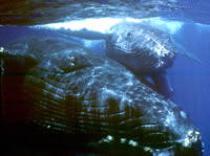New Report: Leading the Way Toward a Clean Ocean
Frontier Group's latest report catalogs the many governments across the world that have taken action to reduce plastic bag pollution, setting a strong example for communities across the United States.
I often go for walks in Oak Park, a pretty green space framing Mission Creek near my house.Typically, park users do a decent job at cleaning up after their weekend celebrations. However, when I find trash in the park, more often than not it takes the form of plastic bags.
Although we use plastic bags for just a few moments to carry groceries around, they can last hundreds of years. When a bag blows into Mission Creek, it can block the flow of water or get swept out to sea. And, as two new studies published in the last several weeks confirm, the bags don’t just sink to the bottom – they enter the food chain.
Fish and whales suffer from ingesting bags and other plastic debris in the ocean. Nine percent of the fish captured in one study in the central Pacific Ocean had plastic in their digestive systems, and a review of two decades of literature found hundreds of examples of whales dying from consuming plastic debris. In particular, Cuvier beaked whales in the Atlantic Ocean, which feed by suction, are particularly vulnerable to dying after eating plastic bags.

As Frontier Group’s newest report documents, more than 80 national and local governments across the planet have taken action to reduce the scourge of plastic bag pollution. Their motivations have varied from a desire to protect local economies dependent on ocean tourism, to eliminating plastic bag litter, to reducing the burden on landfills. Others have recognized that plastic bags are a wasteful use of limited fossil fuel resources.
All of these policies point the way toward a more sustainable society that generates less trash. By encouraging citizens to switch to reusable bags, these policies cut down on the amount of plastic trash ending up in landfills and the ocean, and raise public consciousness about the need to take care of our world.
Last week, in my home city of Santa Barbara, the city council considered taking action against plastic bags. While the council unfortunately decided to kick the bag down the road, so to speak, other communities across California can look toward the leaders profiled in our newest report. Each new county, city or town that takes action to reduce plastic bag pollution builds momentum towards a cleaner ocean for current and future generations.
